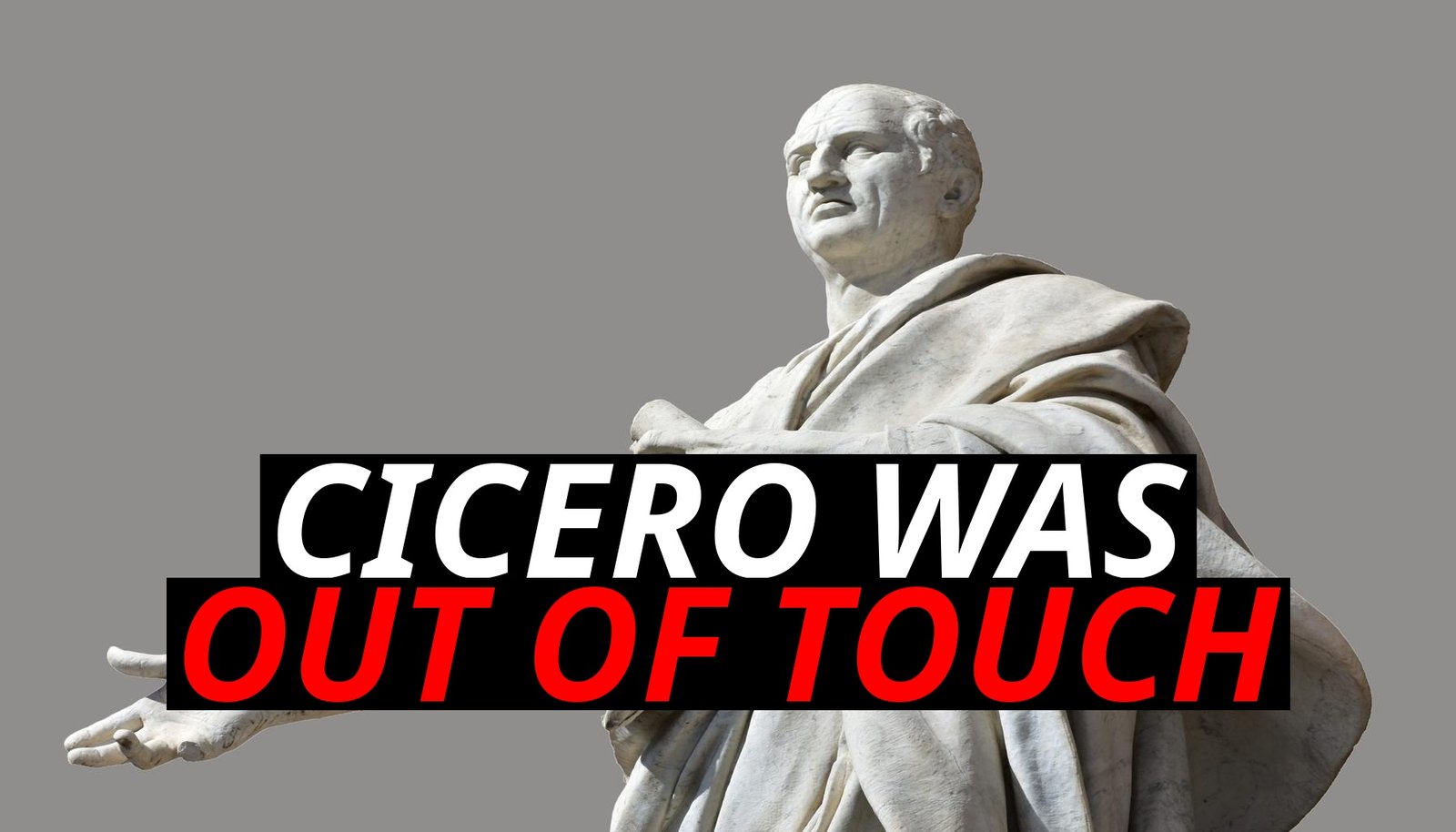Cicero is often remembered as one of Rome’s greatest orators, a champion of republican values, and a defender of the Senate during the final years of the Roman Republic. But there’s another side to his legacy—one that casts him not as a hero of the people, but as a defender of an out-of-touch aristocracy. Cicero’s unwavering support for the senatorial elite, coupled with his opposition to populist reforms, raises an important question: was Cicero really in tune with the needs of ordinary Romans, or was he simply an elitist clinging to a crumbling status quo?
In many ways, Cicero’s life and career reflect the tension between intellectualism, political conservatism, and the widening gap between Rome’s elites and its everyday citizens. Let’s take a closer look at how Cicero’s actions, though aimed at preserving the Republic, may have alienated the very people he claimed to protect.
Cicero: Defender Of The Senate
Cicero’s political career was built on his belief in the Roman Republic, with its complex system of checks and balances that ensured no single individual could wield unchecked power. Central to this system was the Senate, an institution dominated by Rome’s wealthy and aristocratic families. To Cicero, the Senate represented Rome’s best and brightest, the guardians of tradition, law, and stability.
- Cicero’s Loyalty to the Aristocracy: Cicero saw the senatorial class as the backbone of Roman society. His speeches and writings often praised the wisdom of the Senate and its role in maintaining order. For Cicero, the Senate was a safeguard against the chaos of populist leaders who promised land, grain, and wealth redistribution to the masses. His support for the elite wasn’t just political—it was philosophical. He believed that Rome’s greatness came from its traditions, and that preserving the old order was essential to maintaining Rome’s power.
- Opposition to Populism: Cicero’s conservatism put him at odds with leaders like Julius Caesar, who gained popular support by advocating for reforms that benefitted Rome’s plebeians and veterans. Caesar’s policies of land redistribution, debt relief, and political enfranchisement were viewed by Cicero as dangerous threats to the stability of the Republic. In Cicero’s eyes, these reforms undermined the Senate’s authority and empowered the masses in ways that could lead to mob rule.
Out Of Touch With The Common People?
While Cicero’s dedication to the Senate was admirable in many ways, it also revealed his detachment from the everyday struggles of ordinary Romans. By refusing to support populist reforms, Cicero earned a reputation among some as an elitist, more interested in protecting the privileges of the wealthy than in addressing the needs of the common people.
- The Plebeians’ Struggles: For Rome’s plebeians—the commoners—life was often difficult. The gap between rich and poor had grown wider by Cicero’s time, as land ownership became concentrated in the hands of a few wealthy families. Unemployment and debt were rampant, and many Romans looked to populist leaders like Caesar to improve their conditions. Cicero’s opposition to Caesar’s reforms, particularly his efforts to redistribute land to the poor and provide debt relief, made him seem indifferent to the suffering of the common people.
- Veterans and Land Reforms: Cicero’s refusal to support Caesar’s land reforms also alienated Rome’s veterans, many of whom had fought in Caesar’s campaigns with the promise of land upon their return. When Cicero opposed these measures, he wasn’t just opposing Caesar—he was opposing thousands of Roman soldiers who had sacrificed for the Republic, only to find their rewards blocked by the Senate’s elite. This stance further distanced Cicero from the broader Roman populace.
The Conflict With Caesar: Elitism Vs. Populism
Cicero’s most significant political conflict came with the rise of Julius Caesar. While Cicero admired Caesar’s talents as a general and leader, he feared Caesar’s ambitions and his ability to bypass the Senate by appealing directly to the people. For Cicero, Caesar represented everything that was wrong with populism—an erosion of traditional Roman values and a direct threat to the authority of the Senate.
- Caesar’s Popular Support: Caesar’s rise was fueled by his populist agenda, which included land reforms, debt relief, and public works projects that benefitted the plebeians and veterans. These policies made him enormously popular with the common people, but they also alarmed the senatorial elite, including Cicero. Cicero viewed these policies as bribes to win popular support at the expense of the Republic’s traditions.
- Cicero’s _Philippics_ Against Antony: After Caesar’s assassination, Cicero’s staunch opposition to Mark Antony—Caesar’s closest ally—further highlighted his fear of populist rule. In a series of speeches known as the _Philippics_, Cicero attacked Antony as a tyrant who sought to continue Caesar’s populist policies and consolidate power for himself. Cicero believed that by defending the Senate and attacking populist leaders like Antony, he was preserving the Republic. But to many Romans, it may have seemed like Cicero was simply protecting the status quo and opposing reforms that could improve their lives.
Cicero’S Legacy: A Champion Or An Elitist?
So, was Cicero truly an elitist out of touch with the needs of the common people, or was he a principled defender of the Republic? The answer lies somewhere in between.
- A Defender of Tradition: There’s no doubt that Cicero genuinely believed in the ideals of the Republic and the importance of the Senate’s authority. He saw the populist reforms of Caesar and Antony as threats to Roman stability and tradition. In that sense, Cicero’s opposition to populism wasn’t driven purely by elitism—it was rooted in his belief that unchecked populism could lead to chaos and dictatorship.
- Disconnected from the People: However, Cicero’s refusal to support populist reforms also shows how disconnected he was from the realities of life for ordinary Romans. While Cicero was focused on preserving the Republic’s institutions, many plebeians and veterans were more concerned with immediate issues like debt, unemployment, and land access. Cicero’s lack of support for these issues made him seem indifferent to the needs of the people he claimed to represent.
The Isolation Of Political Elites
Cicero’s career highlights a broader pattern seen throughout history—how political figures, when focused solely on maintaining the status quo, can become isolated from the public they serve. By aligning himself so closely with the senatorial elite and opposing populist reforms, Cicero failed to see that the Republic he was defending was already losing the support of the common people.
- Political Figures and Status Quo: History is full of examples of leaders who, like Cicero, championed the interests of the ruling class at the expense of the broader population. These figures often find themselves increasingly isolated, as the gap between the elite and the common people grows wider. Cicero’s failure to adapt to the changing political landscape ultimately led to his downfall—he was caught in a world where the needs of ordinary Romans were being drowned out by his commitment to the Senate’s authority.
- A Cautionary Tale: Cicero’s story serves as a cautionary tale for politicians and intellectuals who become too closely aligned with the elite. While preserving tradition and stability is important, so too is understanding the needs and concerns of the broader population. Leaders who fail to bridge the gap between the elite and the people risk losing the very support that sustains their power.
Conclusion: A Complex Legacy
Cicero’s legacy is undeniably complex. He was a brilliant orator, philosopher, and defender of the Republic’s ideals, but his unwavering support for the senatorial elite and his opposition to populist reforms made him seem out of touch with the needs of ordinary Romans. While his fear of unchecked populism may have been justified, his failure to address the growing divide between the rich and the poor ultimately contributed to the Republic’s downfall.
Cicero’s life reminds us that even the most talented political figures can become isolated from the public when they focus solely on preserving the status quo. His story serves as a reminder that true leadership requires not only defending tradition but also understanding the needs of the people—and knowing when it’s time for change.













